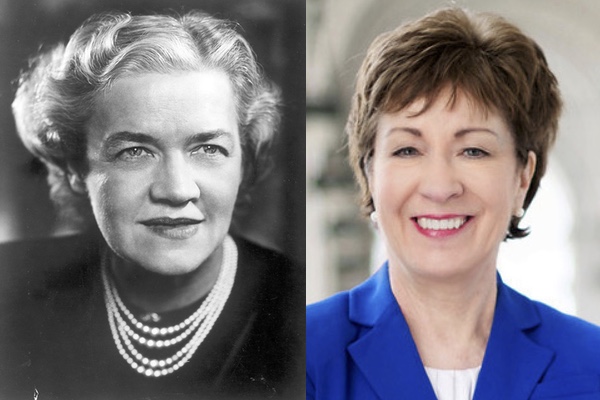The Short List of Senators Who Stood Up to Bullies Includes Two Women from Maine.

Republican Senator Susan Collins of Maine , in an op-ed in the Washington Post on August 9 became the first Republican senator to break with presidential nominee Donald Trump.
While most other Republican leaders have continued to support Trump despite his blunders, blustering and verbal assaults on women, Collins has stood firm. After Trump's sexually aggressive comments from 2005 were published earlier this month, Collins issued a statement on October 8 :
 “Donald Trump’s lewd
comments are the latest in a series of remarks he has made ranging
from inappropriate to reprehensible that demonstrate why he is
unsuitable for the presidency. It was comments like these, including
the statements he made about John McCain, a disabled reporter, the
family of a fallen soldier and more, that caused me to decide this
summer that I could not support his candidacy.”
“Donald Trump’s lewd
comments are the latest in a series of remarks he has made ranging
from inappropriate to reprehensible that demonstrate why he is
unsuitable for the presidency. It was comments like these, including
the statements he made about John McCain, a disabled reporter, the
family of a fallen soldier and more, that caused me to decide this
summer that I could not support his candidacy.”
Collins continues a Maine tradition of standing up to demagogues and bullies, dating back to her predecessor, Republican Margaret Chase Smith, who served from 1949 to 1973.
Collins expressed dismay over Trump's constant stream of cruel comments and his inability to admit error or apologize and his "disregard for the precept of treating others with respect, an idea that should transcend politics." She is alarmed that his "lack of self-restraint and his barrage of ill-informed comments would make an already perilous world even more so."
Collins's August statement denouncing Trump is remarkably like that of Senator Smith's eloquent "Declaration of Conscience" on the floor of the Senate on June 1, 1950.
Smith was alarmed by the strident campaign by another Republican, Senator Joseph McCarthy from Wisconsin, to convince Americans that there was a communist conspiracy afoot to destroy the country and that there were many communists in the federal government. McCarthy kept making accusations, got lots of press coverage, stirred up public fears, but offered no concrete evidence.
Like Trump, McCarthy was bombastic, made accusatory assertions without offering evidence to substantiate them, demonized his critics, and ascribed base motives to anyone who opposed him.
Without mentioning McCarthy by name, Smith declared that: "Today our country is being psychologically divided by the confusion and the suspicions that are bred in the United States Senate to spread like cancerous tentacles of 'know nothing, suspect everything' attitudes. "
"I am not proud of the way in which the Senate has been made a publicity platform for irresponsible sensationalism," she declared."The American people are sick and tired of being afraid to speak their minds lest they be politically smeared as 'Communists' or 'Fascists' by their opponents.
Smith included some mild criticism of the lax international security policies of the Truman administration but emphasized " the basic principles of Americanism: The right to criticize; the right to hold unpopular beliefs; the right to protest; the right of independent thought."
Smith stood alone. Six other senators endorsed her statement but none had her courage to speak out. McCarthy denounced her and the six senators as "Snow White and the Seven Dwarfs" and they withdrew their support. He helped finance an unsuccessful primary challenge during her re-election campaign in 1954.
McCarthy expanded his mostly unsubstantiated accusations against leaders high up in the government who were allegedly conniving with Communists to weaken the nation.
Undeterred, Smith kept up her criticism of McCarthy.
Senators from both parties feared McCarthy and were slow to join her. Even Republican Dwight Eisenhower, who became president in 1953, was reluctant to take on McCarthy. Finally, though, in 1954, the Senate censured him for his irresponsible statements and behavior.
Smith asserted that she was proud of being a Republican but "I do now want to see the Republican Party ride to victory on the Four Horsemen of Calumny -- Fear, Ignorance, Bigotry and Smear."
McCarthy tapped into what Smith referred to as "a national feeling of fear and frustration."
Trump is tapping into a similar sense of unease today, in Collins's view. "I realize that Mr. Trump’s success reflects profound discontent in this country, particularly among those who feel left behind by an unbalanced economy and who wonder whether their children will have a better life than their parents," she said.
But as Smith put it in 1950,"a philosophy that lacks political integrity or intellectual honesty would prove ... disastrous to this nation."
Or, as Collins put it in her August statement, she is concerned that Trump's "lack of self-restraint and his barrage of ill-informed comments would make an already perilous world even more so."
Republicans were mostly afraid to follow Margaret Chase Smith in 1950. Four years later, when McCarthy was finally censored after a good deal of damage had been done to the nation, they acknowledged they should have acted.
Most Republicans have been afraid to follow Collins this year. Trump has threatened retribution against Republicans who oppose him. Maine's Republican Governor Paul LePage, a Trump supporter who hopes that Trump will "show some authoritarian power in our country and bring back the rule of law,” condemned Collins for being part of a group that "claim to be Republicans that are shooting their mouths off.”
But Collins is sticking with her principled opposition.
So
did Margaret Chase Smith. History vindicated Smith for her courageous
stand and tenacity. Republicans supporting Trump this year can
anticipate that history will likely do the same for Susan Collins.